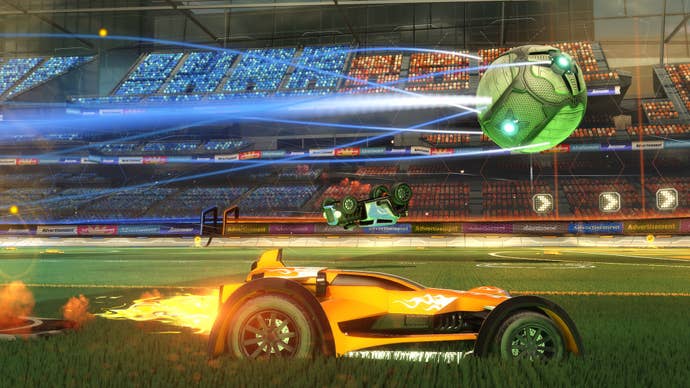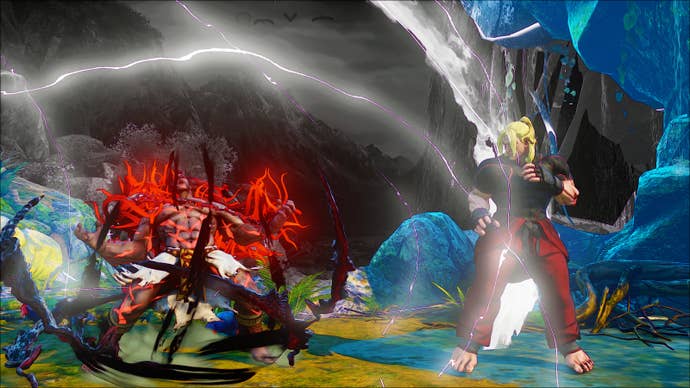The Race to Become the Next Big eSport
COVER STORY: From Halo to Rocket League, seemingly every developer wants their game to be a big-time eSport, and the stakes are even higher than you realize.
This article first appeared on USgamer, a partner publication of VG247. Some content, such as this article, has been migrated to VG247 for posterity after USgamer's closure - but it has not been edited or further vetted by the VG247 team.

Rocketing to the top
Rocket League, as it happens, is the counterpoint to the large-scale eSports investment by Activision Blizzard and the rest. In the current environment, grand plans often pale in comparison to just having a really good game. Rocket League was a smash hit when it launched last year, bringing with it an instant competitive community - the kind of scene that money simply can't buy.
It's the ideal candidate for an eSport - fast and accessible, but deeper than it looks. It's one of the few sports games to actually capture the joy of playing sports. With its fast-paced matches, which can be completed in less than 10 minutes, it also has an addictive quality to it. Not surprisingly, things have moved incredibly quickly for Rocket League. Within three days of launch, Rocket League was added to the Electronic Sports League's (ESL) competitive roster, following by Major League Gaming (MLG). In November, iBuyPower signed the Rocket League team Cosmic Aftershock to what was the largest sponsorship deal to that point. Cosmic Aftershock had made a name for themselves back in August - only a month after Rocket League's release - by dominating the early competitive scene and making MLG's Grand Finals.
Psyonix CEO and design director Dave Hagewood admits that the team hoped Rocket League would be come a viable eSport, but that they didn't quite dare to invest in it. As a result, they've spent the past several months playing catch-up and building the infrastructure they need as quickly as possible.
"A lot of it came afterwards, when we were working on spectator mode and so on. In a lot of ways, the spectator mode has been built more for announcers than it has for regular players; we wanted features in there that would just make it really easy to flip between camera views and things in a live announcing sort of environment. Before that, I think we couldn't be sure enough about eSports to add major eSports-specific features; we tried to combine anything that we wanted to do with eSports with what would make the game more fun in general," Hagewood says.
As it enters its second season of competitive play, Rocket League remains something of a work in progress. Psyonix is replacing their ten Season 1 divisions with 12 new ones and removing Rank Points - making all divisions based on Skill Rating. There will also no longer be a hard cap on the number of players in the top division. Right now, Rocket League faces the challenge of being too top-heavy. With the initial surge of interest having subsided somewhat, new players - the lifeblood of any competitive community - are having a harder time breaking in. Veterans hope that tweaks to the matchmaking will even things out a bit and make it easier for players to matchup with opponents of a similar ability level.
"We look at eSports as a way to keep Rocket League in the global mindshare. We want people to still be hearing about it, we want people to still be playing it – it's very hard to draw a direct line to how that profits us."
Psyonix, for their part, is growing as well. While still very much an independent studio, they are now up to 50 employees, most of whom are dedicated to the behind-the-scenes infrastructure an online game needs to be successful. Their growing pains are reminiscent of Riot's; and while they're unlikely to launch anything as ambitious as the LCS, they have a solid foundation for future success. Even if it doesn't break into the top-tier of eSports, it's apt to be a mainstay for the forseeable future.
Many developers would pay dearly for Rocket League's immediate success. But making a great competitive game can be as much of an art as it is a science, and there's never any guarantee that a competitive game will coalesce around a given game. Rocket League benefited from an ideal release window and a low price point; but without its beautifully tuned and accessible gameplay, its community might have dissipated immediately. Psyonix has truly caught lightning in a bottle.
As for everyone else, the eSports landscape is becoming increasingly crowded, and even established franchises may find themselves shouting into the void.
Late to the party
In discussing with me the premise for this article the other day, a friend of mine observed, "The eSports gold rush has been done for a couple years. Everyone else is just late to the party."
That knowledge tinges moves like Activision Blizzard's purchase of MLG and the creation of the Halo Championship Series. eSports is obviously worth investing in, but many of these publishers have a huge amount of catching up to do. They'll have to bank on their own substantial resources and name recognition along with a seemingly unquenchable thirst for eSports to make up ground.

Among the franchises playing catch-up is Street Fighter V, which launches next week. Though Street Fighter has long had an active and vibrant tournament scene, it's never come close to matching the numbers put up by games like DotA 2. Series producer Yoshinori Ono admits that Riot really has nothing to learn from Street Fighter because they are currently "at their absolute peak."
"They've reached the top of the esports arena, so there's a lot we feel like we need to study and learn from them in terms of how they did that in [three to four years]. And we don't know what that is, but we've got to keep studying," he says.
Ono hopes to make Street Fighter V accessible enough to get new players in on the ground floor, likening it to a "fighting game dojo." That way they can enjoy high-level competitive play even if they aren't especially good. He observes, "Talking about what Riot is doing with League of Legends, if you watch Twitch, if you watch any of that stuff, there's a lot of people who are not necessarily good at that game. Actually, I would go outright and say they're just not good players. But, somehow, they still jump in and they're participating and playing, and that's the thing that we really need to sit down and learn from Riot and what they've done, learn how did they get these people - even if they're not good - to want to challenge themselves."
